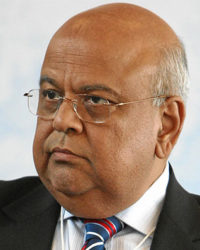CAPE TOWN/JOHANNESBURG, (Reuters) – South African leader Jacob Zuma attempted yesterday to brush aside market fears of a power struggle with Finance Minister Pravin Gordhan, declaring: “There is no war between the Presidency and the Treasury.”
Zuma twice repeated the phrase in response to a question in parliament. “I am clarifying that point. It must be as clear as anything,” he told lawmakers.
An elite police unit is investigating Gordhan over a so-called “rogue spy” unit at the tax agency, set up when he was at its helm. Some analysts say Zuma’s allies are driving the probe in a bid to oust Gordhan, something the president denied.
The affair has rattled markets in Africa’s most industrialised economy, which faces the risk of ratings downgrades later this year. Divisions within the African National Congress have widened since the ruling party suffered its worst-ever local election results last month, with analysts blaming the rifts on a conflict between Zuma and Gordhan.

Gordhan declined last month to obey a police summons linked to the inquiry into whether he had used a tax service unit to spy on politicians, including Zuma. He said he had done nothing wrong, and the opposition has called the investigation a witch hunt.
Deputy Finance Minister Mcebisi Jonas earlier said that the probe into Gordhan was causing economic uncertainty.
“It does destabilise, not only Treasury, it creates uncertainties across the economy,” Jonas told 702 Talk Radio. “We feel confident there is no basis for the allegation. We are not worried about that.”
Jonas also said he had met Public Protector Thuli Madonsela, an anti-corruption watchdog, as part of her inquiry into whether the wealthy Gupta family, who are close to Zuma, have been influencing high-level political appointments.
Jonas dropped a political bombshell earlier this year when he said the Gupta family offered to secure him his boss’s job. Nhlanhla Nene was the finance minister at the time.
Zuma has said that the Guptas are his friends but denies doing anything improper. The Guptas have also denied making job offers to anyone in government.
A frustrated Zuma also complained about the constant heckling he faces from opposition parties when he tries to address parliament. The ultra-left Economic Freedom Fighters party earlier walked out of parliament after initially disrupting Zuma’s answers to the national assembly.
“Each time when I come here, I am abused by members of your parliament, because instead of answering questions I sit here being called a criminal, a thief. I think this house must do something about it,” he said.
In a rebuke that hit Zuma financially and politically, the Constitutional Court ordered him in March to return some of the $16 million of state money spent on enhancing his private residence, triggering claims by opposition parties that he should resign.
Zuma denied he had acted dishonestly over the upgrade. On Monday, the Presidency said he had repaid 7.8 million rand ($542,000) – the sum determined by the Treasury in June as the “reasonable cost” he should bear.
Amid the political rumblings, there was a glimmer of good news on the economic front. The current account deficit narrowed more than expected in the second quarter, supporting Gordhan’s view that the economy was not in “recession territory”. .
South Africa has a better than 50 percent chance of avoiding a downgrade of its credit rating to “junk” status this year, Gordhan told business leaders in Johannesburg on Tuesday. He also pledged to stick to deficit targets set out in his budget in February, despite weak economic growth.
He warned, however, that surprising economic growth of 3.3 percent in the second quarter could not be sustained, and pledged continued fiscal prudence, a key recommendation by ratings agencies.
“The next year or so is quite critical, not just for ratings but for ourselves as an economy and as a country as well,” Gordhan told business leaders.

